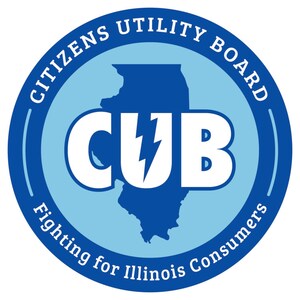CHICAGO, March 2, 2022 /PRNewswire/ -- The Citizens Utility Board (CUB) on Wednesday alerted consumers about the twelfth straight month of high heating prices and warned them of harmful myths about their natural gas bills.
CUB urged consumers to visit a free online resource, CUBHelpCenter.com. It explains why gas prices are high, offers safety and efficiency tips, outlines a customer's rights against disconnection and arms people with information about energy assistance.
About 80 percent of Illinois homes heat with natural gas, and this has been their most expensive winter since the cold season of 2008-09. Illinois' natural gas utilities file new supply prices–called the Purchased Gas Adjustment (PGA)–each month. In March, the utilities continue to charge extremely high prices, including Nicor Gas, Illinois' largest gas utility, which saw a 24 percent increase from February, and a 94 percent increase from March 2021:
- Ameren Illinois – 68.881¢ per therm (Up about 76 percent from March 2021.)
- MidAmerican Energy – $1.0029 per therm (Up about 115 percent from last March.)
- Nicor Gas – 68.00¢ per therm (Up about 94 percent from last March.)
- North Shore Gas – 63.45¢ per therm (Up about 56 percent from last March.)
- Peoples Gas – 60.08¢ per therm (Up about 87 percent from last March.)
Note: You cannot switch to another utility. Utility service territories are geographic: Your utility is determined by where you live. Gas utilities are not allowed to profit off supply prices—they pass those costs from gas producers and marketers onto customers with no markup. State regulators annually review the utilities' gas-management procedures to ensure the companies did a reasonable job with their gas purchases, given market conditions, to hold down costs for consumers as much as possible.
For 12 months now, natural gas supply prices have been elevated, sparked at first by record-low temperatures that hit the nation last February, causing cascading effects to gas supply and distribution systems in the South that were not properly weatherized, just as demand went up. A number of other factors have contributed to the spike, including declining gas production, exploration and well construction. The war in Ukraine may also contribute to elevated prices going forward.
The price spike also has sparked misinformation. CUB identified key myths about the high bills.
Myth: The high gas bills are just a result of supply and demand.
Fact: High supply prices are only part of the story. In Illinois, overly aggressive spending and rampant rate hikes by Peoples Gas, Nicor Gas and Ameren Illinois also are contributing to skyrocketing gas bills this winter.
While utilities cannot profit off gas supply, they have increased and profited off another part of the bill: Delivery, what they charge to deliver gas to homes. CUB is working to eliminate the "Qualified Infrastructure Plant" surcharge from Ameren, Nicor and Peoples Gas bills. The charge, which went into effect thanks to a law the General Assembly passed in 2013, allows gas utilities to sidestep the traditional regulatory process and rake in revenue more quickly, leading to rapidly rising heating bills.
The charge on Peoples Gas bills is now more than $13 a month, on average—on track for more than $150 a year. Also, Ameren Illinois received a $76 million gas rate hike in 2021, and Nicor has increased delivery rates by 77 percent, or $500 million, since 2018. That includes its $240 million increase in November—the largest gas hike in Illinois history. The parent companies of these utilities raked in billions of dollars in combined profits in 2021.
Myth: The high gas prices are the result of environmental policy.
Fact: This price spike has nothing to do with environmental policy. The high gas prices began last year as a result of volatile weather—record cold—that has become more frequent as climate change gets worse. Plus, price spikes like this in the market happen periodically, as a consequence of the business model of the fossil fuel industry. Far from causing the problem, clean energy policies—including strong efficiency provisions that help reduce utility bills—are trying to combat the causes of the spike.
Myth: You can't get your gas shut off in the winter.
Fact: Although there are regulations that prevent disconnections during the winter months, they are not applicable to every account and/or circumstance. Do not assume you are protected just because it is cold. It's vitally important that customers having difficulty paying their gas bills contact their utility to learn about energy assistance available and to work out a consumer-friendly plan to pay your bills and stay connected. Keep the lines of communication open.
Myth: Alternative gas suppliers can guarantee savings for consumers this winter.
Fact: In Northern Illinois, suppliers may try to use the headlines about high prices to lure you into a bad deal. Remember, suppliers are impacted by the same market conditions that are causing utility supply rates to go up. If an offer from a supplier seems too good to be true, there's a good chance it is. The alternative supplier market has been plagued by bad deals and rip-offs, so if you shop for another supplier, be careful. The most reliable way to soften the blow of these high prices is to practice energy efficiency at home.
CUB is Illinois' leading nonprofit utility watchdog group. Created by the Illinois Legislature, CUB opened its doors in 1984 to represent the interests of residential and small-business utility customers. Since then, CUB has saved consumers more than $20 billion by helping to block rate hikes and secure refunds. For more information, call CUB's Consumer Hotline at 1-800-669-5556 or visit CUB's award-winning website, www.CitizensUtilityBoard.org.
SOURCE Citizens Utility Board

WANT YOUR COMPANY'S NEWS FEATURED ON PRNEWSWIRE.COM?
Newsrooms &
Influencers
Digital Media
Outlets
Journalists
Opted In



Share this article